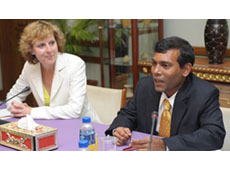I am not exactly sure who’s idea it was or how it came to be, but in what a lot of environmentalists consider a great move the government has decided to arm the police (and yes, I said ‘arm’) with bicycles!
As with many great ideas, this particular idea is being ridiculed as wasteful and derogatory to the police. One comment by ‘rini’ on the Minivan News article even claimed it was it a demotion equivalent to that of being lowered to the level of “rubbish collecting bangaalhis”.
For now, I’ll leave the analysis on the apparent xenophobia aside and talk about why bicycles are considered the lowest of the low in the streets.
Let’s have a look at the Minivan article comments once more.
Salim Waheed and Muad MZ for once seem to agree on something and most of the Minivan News commenting community seems to applaud the idea with ‘happy faces’ and all.
Apart from one very practical comment by Knox who asks whether or not this heat will ever make this idea do-able there is another very relevant issue raised by Hassan-Raha who asks: “Salim, when is your Dad and President going to show that we can be a carbon neutral country, give up the car and start pedalling or walking?’
This, for me, was the most relevant of all the comments. Street safety is a class issue in Maldives. The rich men and women and their children either own cars or scooters and/or take taxis. The very rich do not even have to resort to taking taxis – riding bikes and walking is for the poor and ‘rubbish collecting bangaalhis’.
No wonder both this and the previous government have not made any effort to make Male a walk-able city.
Even after the change in government, parking lots seem to have taken priority over pedestrian pavements, and even in narrow goalhis and the few proper pavements we do have do not have easy access for the disabled or the baby prams that walking mothers usually push around.
Meanwhile, all ministers, top army officers and their families are provided with government funded cars and petrol.
No ‘self respecting woman’ will walk anywhere and if you ask why you’ll get the usual myriad complaints about the heat. However this heat will not affect any of these women while walking around Orchard Road on their annual shopping trips, aka trips to the hospital.
So, we have to ask ourselves, is it really the heat that is stopping us from walking around our God-given two square kilometres or is it the fact that every single time you walk somewhere you risk being
- Hit by a scooter or a car and killed
- Hit on by various Romeo’s who comment on the size of your rear end
- Physically molested by persons reaching to grab your privates, pinching your breasts etc
- Spat on by those of us who consider spitting on the streets an endurance sport
- Told off by a superior being that your are not covered up well enough (by the way, covered up women are not free from harassment)
Walking in Male is a health and safety hazard, especially for women. The reason why I was so encouraged to see the police riding bicycles is my strong belief that unless policy makers and those who are in power face the issues that your average cyclist or walker faces, these problems will never be addressed.
If the Minister of Transport or the head of Male Municipality has a state funded car he/she will always plan the streets in a car-friendly manner, as can be seen from the narrow pavements and the ubiquitous traffic lights that make no sense to most pedestrians. If the Transport minister and the head of Male municipality cycles to work, surely they will come up with better ideas to make Male safer and similar to somewhere like Villi-Male.
The number of traffic-related deaths in the country is unacceptable and we still do not consider these crazy scooters as the death traps that they are. I call upon this administration to consider making most goalhi’s bike and pedestrian only, and remove the parking spaces that leave a narrow two feet walking space where pedestrians are constantly hit by zooming motor cycles.
The solution for making streets safer for women and children both from sexual and physical violence has to be holistic and has to encompass all aspects of peoples lifestyles. It cannot be a ghettoed approach targeting at women only.
Making streets safer for everyone in the community, including the ‘garbage carrying bangalhis’ is the way forward.
Republished with permission http://rehendhi.wordpress.com. All comment pieces are the sole view of the author and do not reflect the editorial policy of Minivan News. If you would like to write an opinion piece, please send proposals to [email protected]
